Border weed: How the hometown of tater tots became a cannabis capital

ONTARIO, Ore. — When Brandon St. Germain got in line to apply for a marijuana dispensary license in this town of 11,000 people along the Idaho border in November 2018, he brought armed guards.
“We’re talking ex-military veterans,” St. Germain said. “They’re standing there with M-16s. They’ve got bulletproof vests on; they’ve got pistols on their hip.”
He had his reasons for the extraordinary security precautions: No one quite knew how many pot shops could ultimately be permitted, making his spot worth millions of dollars in potential sales.
That’s because this small agricultural town — best known for Ore-lda’s creation of the tater tot in the 1950s — is just a 50-minute drive from Boise, Idaho. It sits at the edge of the Treasure Valley, where more than 700,000 people — 40 percent of Idaho’s population — reside.
Marijuana remains illegal in Idaho. In fact, it is one of only two states left in the nation that bans all forms of cannabis, including hemp and CBD products. But drive across the border into Oregon, and Idahoans can purchase every conceivable type of cannabis product, from THC infused artisan grape taffy to 1.5 gram pre-rolled joints.
In the year and a half since Ontario began allowing weed sales, nine dispensaries have opened. It’s estimated that the city will generate $120 to $130 million in annual sales when the cannabis industry is fully up and running — that’s more than 10 percent of Oregon’s sales in 2020.
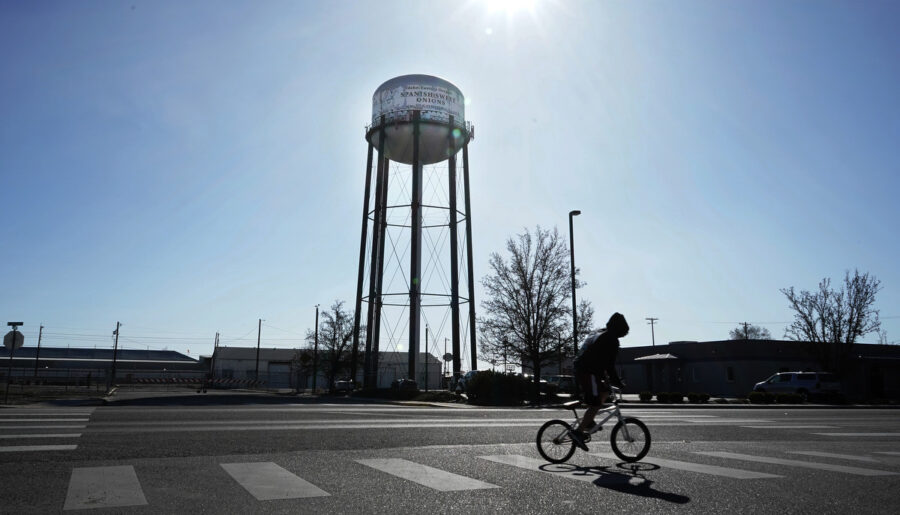
“We’re talking millions of dollars in revenue to stand in this spot in line,” said St. Germain, who, like many other applicants, camped out overnight to file his paperwork.
It paid off. Once the city opened up the licensing process, the company St. Germain worked for — Spokane, Wash.-based chain Cannabis & Glass — got a license. And St. Germain himself got a new job out of the experience: Jeremy Archie, co-owner of Treasure Valley Cannabis Company, poached him while they stood in line together.
Ontario City Manager Adam Brown estimates that Idahoans make 1,600 “unique trips” across the border each day to shop in the town’s dispensaries and tax-free big box stores like Home Depot — that’s a total of 11,200 trips each week, with the highest traffic on weekends.
Ontario is just one of dozens of border communities around the country that have been transformed into marijuana boom towns thanks to the country’s patchwork quilt of cannabis laws. Eighteen states now embrace full legalization, and all of them but California and Alaska share a border with at least one state where cannabis is illegal. Spokane, Wash., Sauget, Ill., Trinidad, Colo., and Great Barrington, Mass., are just a few towns where marijuana entrepreneurs have found fertile ground in these border regions between legal and non-legal states.
Big traffic, small town
Get off Interstate 84 and head east on a weekend, and you will immediately get tied up in a snarl of cars bearing into a large shopping center with a Home Depot, a Walmart, a smattering of fast food restaurants — and four cannabis dispensaries. Most license plates are from Idaho, and many locals avoid the area on the weekend.
“Our nice quiet town has become complete chaos,” said Rachel Quaid, 39, a lifelong Ontario resident who dislikes the huge increase in traffic that cannabis legalization has brought to her town. “[Idaho] needs to legalize it. That way people will stay in their state.”
Ontario is the only city in Malheur County that allows weed sales. The county of about 32,000 residents had $92 million in cannabis sales in 2020, according to Portland Business Journal. By contrast, 48,000-resident Lincoln County, a popular tourist area for legal weed, generated about $21 million. Ontario’s nine dispensaries sold an eye-popping $2,857 of cannabis per county resident in 2020. In Multnomah County — the state’s most populous county, which encompasses much of Portland, a marijuana powerhouse — the cannabis industry sold only $378 per resident last year.
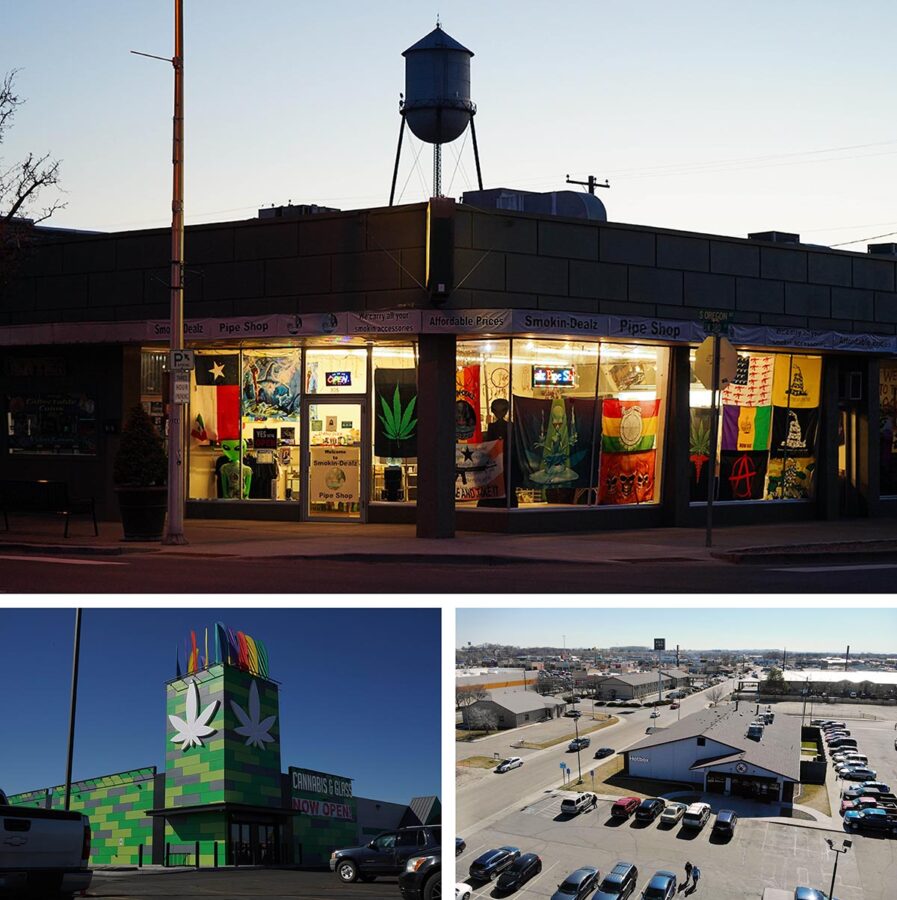
That’s led to a significant financial windfall for the city. In 2020, Ontario took in $1.5 million in tax revenue from weed, and is expecting close to $3 million in 2021 — about 9 percent of the city’s $35 million annual budget. And a lot of that additional tax revenue is coming from Idahoans.
People are willing to travel far for legal cannabis, even if illicit products are available in their hometown. Michelle drives four hours from southeastern Idaho every few months to visit Hotbox in Ontario. She said it’s worth the trip for the peace of mind.
“The problem is, you don’t know what you’re getting [in the illicit market],” said 46-year-old Michelle — who asked that her last name be left out because she planned to take products back across the border into Idaho. There’s less risk in consuming the Oregon products, she added, because you know “it didn’t get transported in a gas tank.”
On a recent Friday night, 11 of the 15 cars in the Treasure Valley Cannabis Company parking lot were from Idaho. At 2 p.m. on Saturday, the Hotbox parking lot had 20 cars, 17 with Idaho plates.
Strained state budgets fuel legalization wave
The fear of losing out on tax revenues to neighboring states is motivating legislatures around the country to consider cannabis legalization.
In the last five months, Arizona, South Dakota, Montana, Virginia, New Mexico, New York and New Jersey have all legalized marijuana. Those new laws have created more than 20 regions potentially rich with border-crossing cannabis business.
Pennsylvanians will likely soon be popping into Camden, N.J., to partake in the Garden State’s newest crop, as will shoppers from Maryland and Delaware — all depositing tax dollars into New Jersey’s coffers.
On the other end of the state, the race is now on to see how Hoboken and Manhattan compete — at least for a little while — on cannabis-driven PATH traffic as they stand up their marijuana industries.
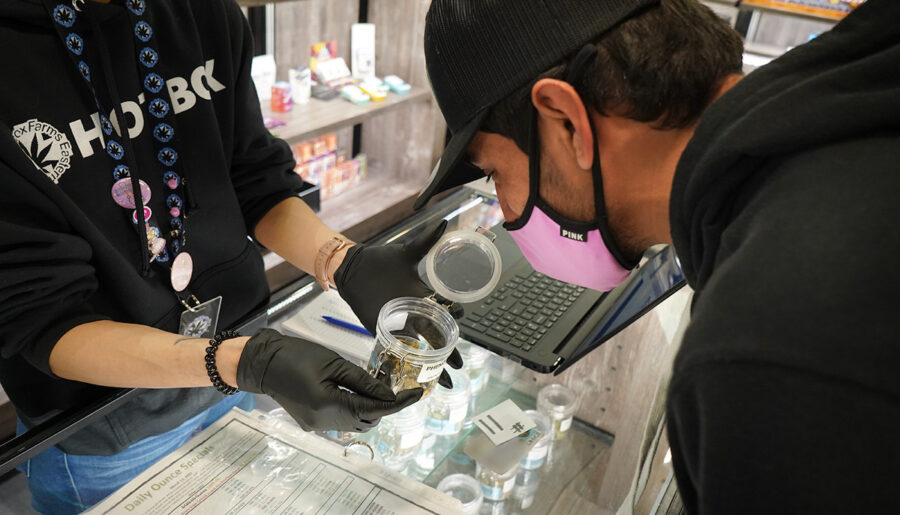
“Colorado to our north [and] Arizona to the west has already done it,” New Mexico Senate President Pro Tempore Mimi Stewart said of legalization in January, just three months before her own state followed through with passing legalization. “If we don’t do it pretty soon, then Texas will do it too, and we will have less revenue.”
When Virginia greenlit marijuana earlier this month, it reignited the debate in North Carolina, where lawmakers introduced a long-shot legalization bill last week. “I fully expect that our citizens in border counties will cross over to Virginia to purchase marijuana for medical and recreational purposes, and that means lost tax revenues,” said North Carolina state Sen. Jay Chaudhuri (D), the lead sponsor of the bill. “Virginia farmers will have a leg up on North Carolina farmers.”
Lawmakers are not the only ones with an eye on border markets. Cannabis companies also see big opportunities.
Jushi Holdings, which has operations in seven states, has opened two shops in southern Illinois, just across from St. Louis, Mo. Erich Mauff, the company’s co-president, points out that even when two bordering states both have legal cannabis, differences in regulation — a lower tax rate or a higher potency limit for edibles, for example — can still lure shoppers into going the extra mile.
“Where you have a dissymmetry of regulatory policy, be it [medical] versus adult use or be it [the sales] tax rate, one [state] will benefit more than the other,” said Mauff. “I don’t think it’s uncommon in business, period, to have this type of location.”
Destination Ontario
While the marijuana boom made Ontario flush with cash, the town initially rebuffed the drug when Oregon legalized it in 2015. In fact, until 2016, Malheur and nearby Baker County had no legal dispensaries. Every town in the conservative county — which former President Donald Trump won with 70 percent of the vote in 2020, and made national headlines in 2016 when the Bundy family staged an armed takeover of a local wildlife refuge — had opted out of the business.
A 2016 initiative to allow sales failed in Ontario, but Huntington — just 30 miles farther into Oregon — approved a legalization measure. Huntington was soon receiving $100,000 in tax revenue from a single marijuana shop — half the 400-person city’s annual budget. In 2018, Ontario tried again, and legalization passed.
Tracy Hammond, who owns Rose Vintage home goods shop in downtown Ontario, wasn’t initially in favor of legalization. “When I watched what was happening to Huntington, and our city was struggling [and] didn’t have any money, then I became for it,” said Hammond, 60, from behind the shop’s counter.
She wishes the city had let at least one dispensary open in Ontario’s historic downtown. While the shopping center on the east side of the highway is packed with people every weekend, downtown Ontario on the west side is nearly empty.
But Hammond says she still sees some benefit from the influx of weekend weed shoppers.
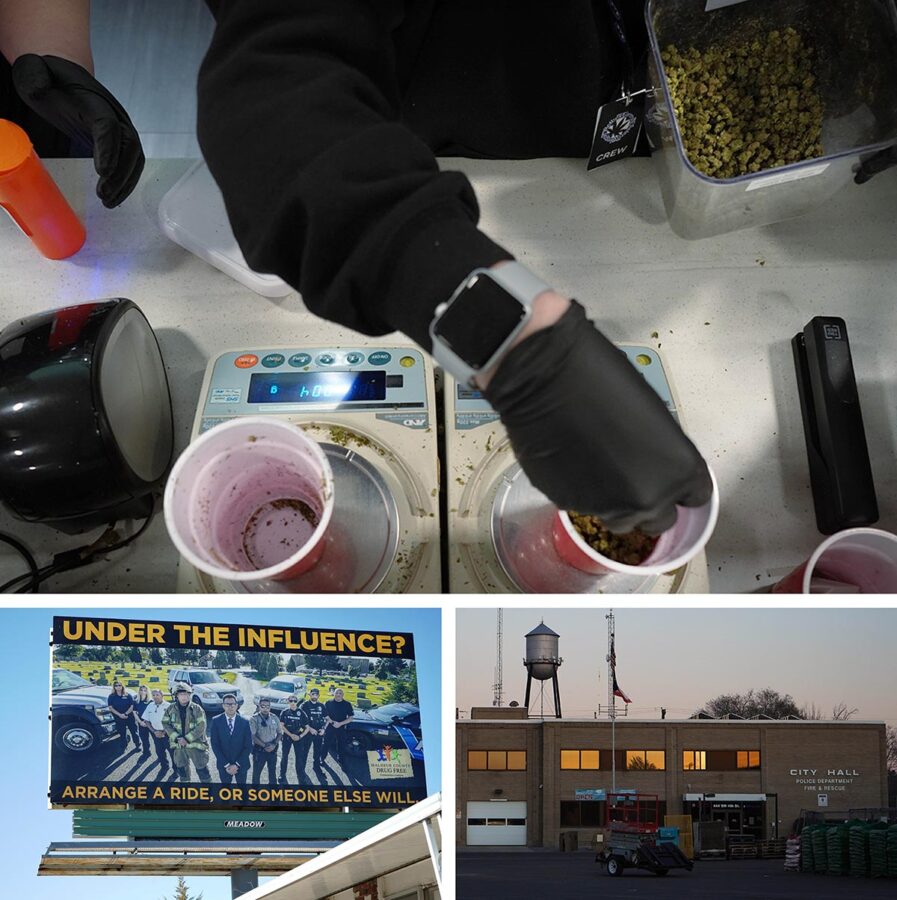
“Several of the cannabis places send people here when they say, ‘Hey, we’re from Idaho, we’re looking for something to do,’” said Hammond. “I think that the dispensaries have brought people in.”
City officials know, however, that the border phenomenon may not last. Despite Idaho’s reticence to legalize, Ontario cannot depend on $3 million in tax revenue every year in perpetuity.
A group of activists in Idaho are pushing to get a legalization initiative on the ballot in 2022. Though Idaho may not be ready for legalization just yet, many in Ontario are prepared for the day that their neighbor goes green.
The impermanence of the dissimilar state laws leaves a question mark over how to allocate the extra revenue. Ontario has decided not to fund any permanent positions, because they don’t want to lay off employees in the event that Idaho legalizes. Instead, city officials are putting the money toward infrastructure projects like sidewalks and a riverfront park, and paying down the town’s debt.
“We tried to put ourselves in a position where we’re a very desirable city when the revenue is gone, and we are more sustainable,” said Brown.
Traffic jams and ‘bizarre behavior’
Ontario’s embrace of weed hasn’t been without headaches. It can get so much traffic on weekends that it overwhelms the town’s infrastructure. Locals complain about huge traffic snarls, and the police department says it’s stretched too thin.
“We need more law enforcement officers,” said Brown. “It’s not directly attributable to the marijuana — just the fact that our city grows [and] swells during the day to much larger capacity than our tax base can support.”
Ontario Police Chief Steven Romero agrees that the revenue is good for the city, but says the increase in traffic has brought other problems. He points to spikes in drugged driving, domestic violence calls where drugs or alcohol are involved, increased public weed consumption, and what he calls “bizarre behavior in public” related to drug use — where someone is irrational or violent. Domestic violence and homelessness have increased nationally during the pandemic, but Romero correlates the rise in Ontario to the dispensaries.
“I’m not convinced that — at least for us — $3 million dollars a year [in revenue] … is a consolation prize for the grief that marijuana [has caused],” Romero said.
And then there are the Idaho police. Ontario blends seamlessly into the town of Fruitland, Idaho. Keep driving east from the highway, past the four dispensaries, the Walmart and the Home Depot, and you’ll see the “Welcome to Idaho” sign at the head of a bridge spanning the Snake River.
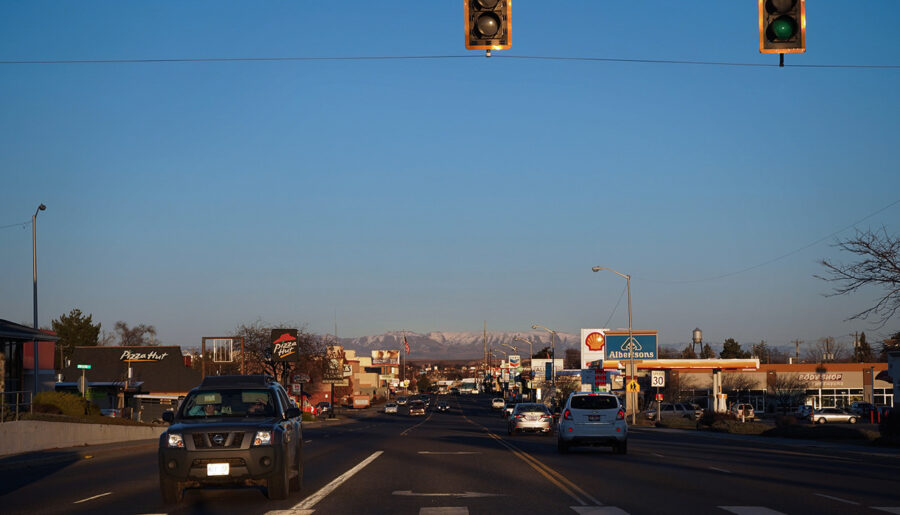
But returning to Idaho with tax-free 2x4s from Home Depot has very different legal implications from returning with a bag of edibles.
Locals say they often see Idaho police camped out just across the border, ready to pull people over and search their vehicles for illegal cannabis.
“I always try and go the speed limit,” said Will, a 26-year-old Treasure Valley Cannabis Company customer who did not want to give his last name since he planned to return to Idaho with his purchases.
Like many other Boise-area commuters, Will stands out from Ontario’s local population. Their new sport utility vehicles, Patagonia zip-ups and “Black Lives Matter” bumper stickers scream “outdoorsy urban millennial,” and fill parking lots in one of the most conservative regions of the Pacific Northwest.
Will says he has not had run-ins personally with the police, but explains there is always discussion about border police activity in a subreddit he belongs to.
“I’ve thought about taking alternate routes … to try and avoid the police,” he said. ”There are a couple other bridges that go through Payette [Idaho] or smaller towns.”
And then there was Snoop
Of all the changes that have occurred in Ontario since weed sales began, nothing quite compares to the time that Snoop Dogg came to town.
When Hotbox Farms opened in Ontario, co-owner Steve Meland wanted to make a big splash. They were planning to do an event with some fireworks, but then a friend reached out.
“He offered that we could bring Snoop Dogg in for the grand opening concert,” Meland explained.
And suddenly, Hotbox had just 48 hours to put on a concert by the famously weed-loving hip-hop legend.
People started showing up in the early morning hours on Saturday, Oct. 6, 2019. By concert time, the town of 11,000 people had grown by an additional 3,000 to 10,000 people, depending on who you ask. Every parking space at Walmart and Home Depot was full, Meland said, and fast food restaurants ran out of food. At first, everyone was standing around in an empty field because the stage didn’t even go up until midday.
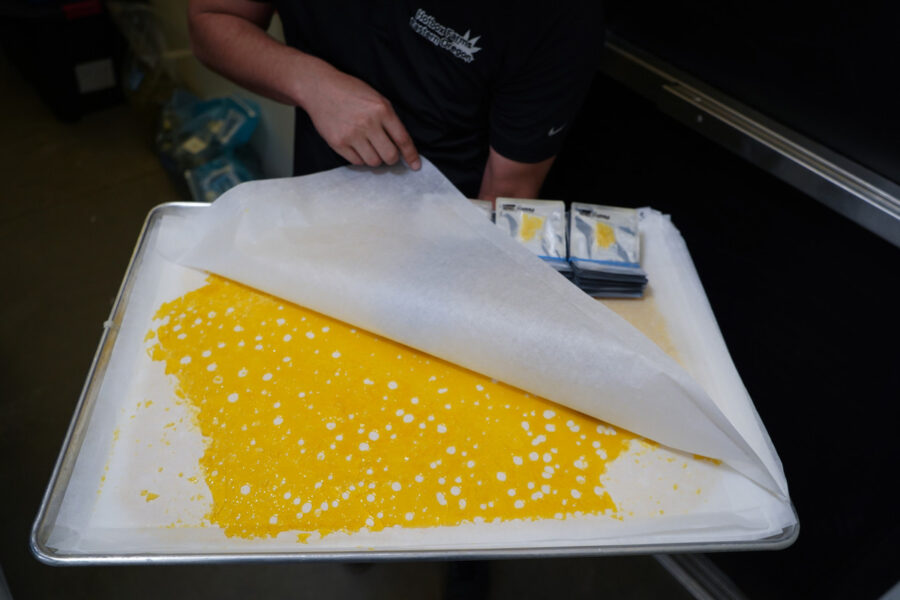
The city didn’t actually give them permission for the concert but Hotbox went ahead anyway.
“It wound up costing them quite a bit of money to have the additional police and firefighters and everything,” Meland explained. “They were really mad.”
Meland said that for other residents of this small farm town, though, the Snoop Dog concert was a once-in-a-lifetime experience, and one more example of how the cannabis industry has transformed the area.
“Lots of people certainly thanked us,” Meland said. “[They] were crying, and said just that they would have never had an opportunity to see a concert of that nature.”
One Ontario resident named Brittan Buhrig summed it up on Twitter later that day: “Snoop put Ontario, Oregon on the map.”
Go To Source
Author: POLITICO

